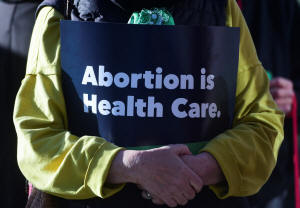How recent lawsuits could affect access to abortion pills
 Send a link to a friend
Send a link to a friend
 [March 16, 2023]
By Brendan Pierson [March 16, 2023]
By Brendan Pierson
(Reuters) - A federal judge in Texas held a hearing on Wednesday in a
case seeking to ban the abortion drug mifepristone nationwide, while at
least three other lawsuits seek to expand access to it. Below is a guide
to what is at stake.
WHAT IS MEDICATION ABORTION?
Medication abortion is a two-drug regimen consisting of mifepristone
followed by misoprostol used to terminate a pregnancy within the first
10 weeks. Medication abortion, which accounts for more than half of U.S.
abortions, has been under increasing scrutiny since the U.S. Supreme
Court last June reversed its landmark 1973 ruling in Roe v. Wade, which
had guaranteed abortion rights nationwide.
WHAT ARE THE LAWSUITS?
Last November, anti-abortion groups sued the U.S. Food and Drug
Administration in Amarillo, Texas, federal court, claiming that the
agency was wrong to approve mifepristone in 2000 because it did not
adequately consider its safety. The groups are asking for a preliminary
order, or injunction, undoing the FDA's approval while the lawsuit
proceeds.
Meanwhile, at least three separate lawsuits were filed earlier this year
seeking to expand access to mifepristone.

In February, twelve Democratic state attorneys general sued the FDA to
challenge the agency's requirement that doctors who prescribe it, and
pharmacies that dispense it, obtain a special certification, arguing
those limits were not supported by evidence.
In another lawsuit in West Virginia, generic mifepristone maker
GenBioPro is asking a federal judge to block West Virginia, which has a
near-total abortion ban, from prohibiting sales of the pills.
In the third lawsuit, a North Carolina doctor is seeking to block that
state's restrictions on the drug, which include requirements that it be
obtained in person from a physician at specially licensed facilities
following mandatory counseling. The state is one of 16 that allow
abortion under some circumstances, but impose additional restrictions on
mifepristone that make it harder to access.
The West Virginia and North Carolina lawsuits rely on a long-established
legal doctrine known as federal preemption, under which federal law - in
this case, the FDA's authority to approve and regulate drugs - overrides
conflicting state law.
WHAT WOULD HAPPEN IF THE TEXAS PLAINTIFFS WIN?
A plaintiffs' victory in Texas could completely remove mifepristone from
the market nationwide, since federal judges have the power in some cases
to issue injunctions that reach beyond their own districts to encompass
the whole country. The FDA said in a recent court filing that pulling
the drug off the market would dramatically harm patients, forcing them
to have unnecessary, and sometimes riskier, surgical abortions and
subjecting them to long wait times.
[to top of second column]
|

Kathy Thomas holds a “abortion is
healthcare” sign during the Women's March protest outside of the
Federal Courthouse against U.S. District Judge Matthew Kacsmaryk as
he hears a motion by anti-abortion groups led by Alliance for
Hippocratic Medicine to pull mifepristone, a drug used in medication
abortion, off the market, in Amarillo, Texas, U.S., March 15, 2023.
REUTERS/Annie Rice
 Abortion providers have raised the
possibility of prescribing misoprostol alone for medication
abortion, which is not a use approved by the FDA but is in some
other countries. Such off-label prescribing is generally legal, but
it is not clear how many providers would adopt it.
IS A WIN BY TEXAS PLAINTIFFS LIKELY?
Legal experts say that challenging FDA approval long after the fact
on alleged safety grounds has no obvious precedent, and the
plaintiffs will need to show a legal reason to overcome the normal
six-year statute of limitations.
By filing in Amarillo, however, the plaintiffs have ensured that
their case went to U.S. District Judge Matthew Kacsmaryk, an
outspoken conservative appointed to the federal bench by former
Republican President Donald Trump, who has been friendly to
conservative causes in past cases.
During Wednesday's hearing, Kacsmaryk thoroughly questioned both
sides but did not clearly signal how he would rule. He raised the
possibility of a narrower order than the plaintiffs are seeking,
which could leave the drugs on the market, but reimpose restrictions
lifted by the Biden administration, including a requirement that
mifepristone be dispensed in person.
WHAT WOULD HAPPEN NEXT?
The FDA would seek an emergency stay of any injunction while it
appeals to the 5th U.S. Circuit Court of Appeals. That court is also
known as conservative, with a majority of judges appointed by
Republicans. But some abortion rights advocates have said they
believe it would be more cautious about pulling an FDA-approved
drug. Whichever way the 5th Circuit rules, the case is likely to
then be appealed to the U.S. Supreme Court.
WHEN COULD THERE BE A RULING?
Kacsmaryk said at the March 15 hearing that he would rule as soon as
possible.
(Reporting by Brendan Pierson in New York; Editing by Alexia
Garamfalvi, Bill Berkrot and Matthew Lewis)
[© 2023 Thomson Reuters. All rights
reserved.]This material may not be published,
broadcast, rewritten or redistributed.
Thompson Reuters is solely responsible for this content.
 |